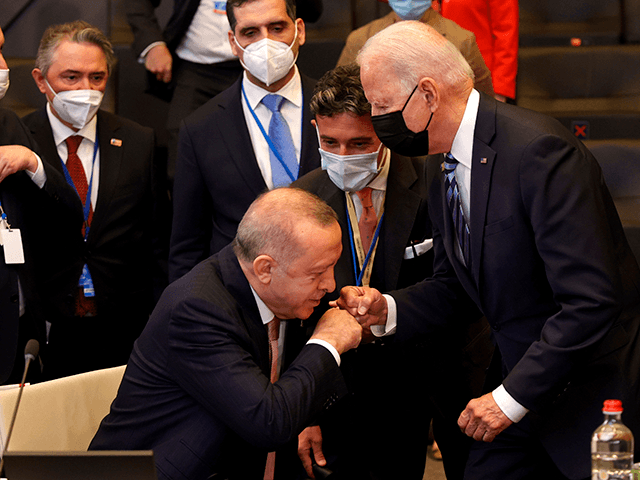Turkish President Recep Tayyip Erdoğan met with U.S. President Joe Biden in Brussels on Monday, on the sidelines of a North Atlantic Treaty Organization (NATO) meeting in the Belgium capital.
The two heads of state organized a closed-door meeting with each other June 14 at 5:00 p.m. local time in Brussels to discuss the U.S.-Turkey bilateral relationship.
President @RTErdogan, who is in Brussels for NATO Leaders’ Summit, met with President Joe Biden of the US. pic.twitter.com/qbvayJkByr
— Turkish Presidency (@trpresidency) June 14, 2021
Erdoğan and Biden reportedly discussed the topic of Syria on June 14, as the two leaders share a desire to reauthorize a Turkish-Syrian border crossing known as Bab al-Hawa, which is the only U.N.-approved humanitarian aid corridor into Syria currently. Bab al-Hawa’s U.N. Security Council authorization as an official passageway into Syria from Turkey expires on July 10. Russia opposes the crossing’s authorization and abstained from the vote on Bab al-Hawa’s reauthorization last year, making the U.S.’s support for the crossing vital. Turkey is not a permanent U.N. Security Council member state, nor is it a temporarily-elected non-permanent member state this year.
Erdoğan and Biden also discussed the topic of Afghanistan at Monday’s meeting, according to Reuters. The U.S. and N.A.T.O. plan to withdraw troops from Afghanistan in September, and Turkey recently offered “to guard and operate Kabul airport” following the military exit.
Erdoğan confirmed that he broached the topic of Turkish involvement in Afghanistan during his dialogue with Biden while speaking at a post-meeting press conference in Brussels on Monday.
“On Afghanistan, Erdogan said the U.S. support in diplomatic, logistical, and financial matters is crucial if the Turkish troops in Afghanistan are asked not to leave the country,” Turkey’s state-run Anadolu Agency reported.
“Turkey is the only reliable country to maintain the process there after the US’ withdrawal [sic]. Our diplomats have already given the necessary answers to their counterparts on this issue. They are also happy and pleased about this. We will discuss Afghanistan and other issues with them,” Erdoğan said at Sunday’s press conference in Belgium ahead of the N.A.T.O. summit.
“NATO head Jens Stoltenberg said Turkey would play a key role [in Afghanistan following the U.S. and N.A.T.O. troop withdrawal] but no decision was made at the Monday summit,” Reuters reported on June 14.
“Erdogan also said Turkey clearly expressed at the NATO summit that the support given to the PYD/PKK terror group should be ended,” according to Anadolu Agency.
Ankara considers the Syrian Kurdish groups working with the U.S.-allied Syrian Democratic Forces (SDF) in Syria as inseparable from the Kurdistan Workers Party (PKK), which both Turkey and the United States consider a terrorist group. The SFD played a primary role in the eradication of the Islamic State caliphate, invading and liberating the “capital,” Raqqa.
Turkey recently upset its N.A.T.O. allies by purchasing and testing a Russian-made S-400 missile defense system from Moscow. Erdogan has previously shrugged off the U.S.-led criticism and insisted Ankara will press forward with using the air defense system.
“We expressed the same thoughts on S-400s to President (Biden) as we had before, also expressed the same thoughts about F-35s [sic],” Erdogan told reporters at the post-meeting press conference, according to Anadolu Agency.
“Ankara and Washington disagree on a number of issues that have further strained bilateral ties in recent years, from Turkey’s purchase of Russian S-400 missile defense systems to the U.S. support to the PKK terrorist group’s Syrian branch, the YPG terrorist group,” the pro-Erdoğan Turkish newspaper Daily Sabah noted on June 13.
“The greatest challenge that Turkey-U.S. relations face is not the problem of Ankara’s purchase of the Russian S-400 missile defense system but rather Washington’s support for the PKK terrorist organization’s Syrian wing, the YPG,” Turkish Defense Minister Hulusi Akar told the Daily Sabah on June 7.
The dialogue served as the first face-to-face encounter between Erdoğan and Biden during Biden’s presidency, though the two politicians previously met when Biden served as vice president from 2009-2017, most recently in August 2016. Erdoğan referred to Biden as his “friend” at a press conference in Brussels on June 13, adding that he hoped his June 14 meeting with the U.S. president would “preserve” the “sensitivity” between the two leaders established in their previous meetings:
This will not be my first meeting with Mr. Biden. We had many meetings with him both during his visit to my home and at the place where I stayed in the US. In other words, he is a friend of ours with whom I met very frequently when he was Mr. Obama’s vice president.
And now I hope we will hold our talks by preserving the same sensitivity and will have taken steps that will let April 24 be forgotten. I hope we will have the same determination regarding NATO as well.
Erdoğan referred to a speech by Biden on April 24, in which the U.S. president formally used the term “genocide” to refer to the 1915 Armenian genocide by the Ottoman empire. Turkey claims that using the term “genocide” to describe the massacre is inappropriate, defying an international consensus by humanitarian groups, historians, and western governments. Erdoğan said he expressed Ankara’s displeasure with Biden over the matter on Monday.

COMMENTS
Please let us know if you're having issues with commenting.